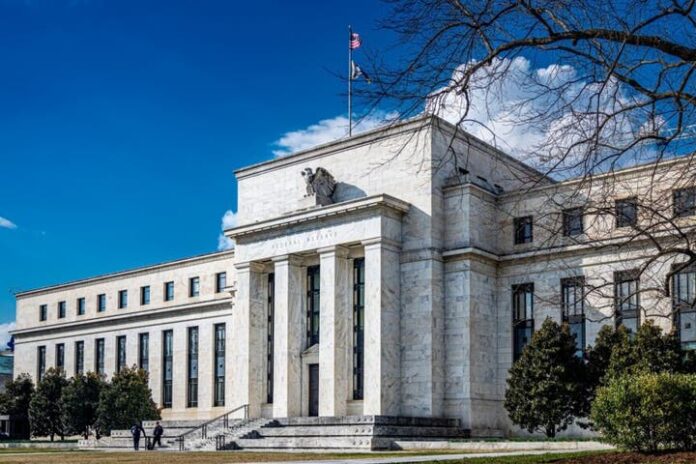Benzinga and Yahoo Finance LLC may earn commission or revenue on some items through the links below.
The Federal Reserve just made a move that could quietly reshape crypto’s relationship with traditional banking. The Fed announced on June 23 that it will drop reputational risk from its bank examination programs—a change that crypto advocates have been pushing for years and one that could finally open the floodgates for mainstream crypto banking services.
Don’t Miss:
While the Fed’s announcement sounds like regulatory wonkery, it strikes at the heart of crypto’s biggest problem: banking access. For years, crypto companies have struggled to maintain basic banking relationships, not because they posed financial risks, but because banks feared regulatory blowback over the industry’s controversial reputation.
Invest in Gold
Powered by Money.com – Yahoo may earn commission from the links above.
“Reputational risk” gave regulators a catch-all tool to pressure banks away from crypto clients. Even legally compliant crypto exchanges, custody providers, and blockchain startups often found themselves cut off from banking services simply because regulators deemed the industry too risky from a PR perspective.
Now, with reputational risk officially removed from examinations, banks will be evaluated purely on measurable financial metrics—not on whether they serve industries that generate negative headlines.
The crypto industry has long argued that regulatory hostility, not actual risk, kept banks at arm’s length. Major crypto companies like Coinbase (NASDAQ:COIN), Kraken, and Circle (NYSE:CRCL) have repeatedly highlighted how difficult it is to secure and maintain banking relationships, despite operating as regulated entities.
Trending: New to crypto? Get up to $400 in rewards for successfully completing short educational courses and making your first qualifying trade on Coinbase.
This change could fundamentally alter that dynamic. Here’s what might happen:
More Banking Partners: Crypto companies may finally gain access to mainstream banking services for payroll, business operations, and customer funds management. This could reduce costs and increase operational efficiency across the sector.
Stablecoin Infrastructure: The move could accelerate adoption of dollar-backed stablecoins, as banks become more willing to hold reserves for compliant stablecoin issuers without fear of regulatory pressure.
Institutional Adoption: Traditional banks might finally feel comfortable offering crypto custody, trading, or investment services to their wealthy clients and institutional customers.
Payment Rails: We could see more integration between crypto payment systems and traditional banking infrastructure, making it easier to move money between crypto and traditional finance.
If banks start treating crypto like any other legal industry, the implications extend far beyond just business operations. Increased banking access could drive significant changes in crypto valuations and adoption:
Reduced Volatility: Better banking relationships could reduce the operational risks that contribute to crypto’s price swings, potentially leading to more stable valuations.
Institutional Inflows: Easier banking access might accelerate the flow of institutional money into crypto markets, similar to what we saw with Bitcoin ETF approvals.
DeFi Integration: Traditional banks might become more willing to explore decentralized finance protocols, potentially bridging the gap between TradFi and DeFi.
It’s crucial to understand what this policy shift doesn’t mean. Crypto companies still need to comply with all existing financial regulations, including anti-money laundering rules, know-your-customer requirements, and securities laws. The Fed emphasized that banks must still maintain “strong risk management” and legal compliance.
Banks also remain free to choose their clients based on actual business risks. They just can’t be penalized by regulators for serving legal crypto businesses solely based on industry reputation.
See Also: A must-have for all crypto enthusiasts: Sign up for the Gemini Credit Card today and earn rewards on Bitcoin Ether, or 60+ other tokens, with every purchase.
This move comes as the crypto industry prepares for potentially friendlier regulatory treatment under the new administration. Combined with the approval of Bitcoin and Ethereum ETFs, institutional adoption by companies like MicroStrategy (NASDAQ:MSTR) and Tesla (NASDAQ:TSLA), and growing clarity around crypto regulations, the Fed’s decision removes another significant barrier to mainstream adoption.
The timing isn’t coincidental. As crypto markets have matured and institutional interest has grown, the argument for treating legally compliant crypto businesses differently from other industries has become harder to justify.
For crypto investors, this regulatory shift could be a game-changer, but the effects will likely unfold over months, not days. Key indicators to monitor:
-
Announcements from major banks about new crypto services
-
Reduced operational costs for crypto companies as banking access improves
-
Increased institutional adoption as traditional finance becomes more comfortable with crypto
-
More stable crypto prices as operational risks decrease
-
Growing integration between crypto and traditional financial systems
While Bitcoin hitting new highs grabs headlines, regulatory changes like this often have more lasting impact on crypto’s long-term trajectory. For an industry that’s spent years fighting for basic banking access, the Fed’s quiet policy shift might be the breakthrough that finally brings crypto fully into the mainstream financial system.
Read Next: Named a TIME Best Invention and Backed by 5,000+ Users, Kara’s Air-to-Water Pod Cuts Plastic and Costs — And You Can Invest At Just $6.37/Share
Image: Shutterstock
This article Fed Quietly Removes Reputational Risk Rule That Kept Banks Away from Crypto—Industry Insiders Say This Changes Everything originally appeared on Benzinga.com



